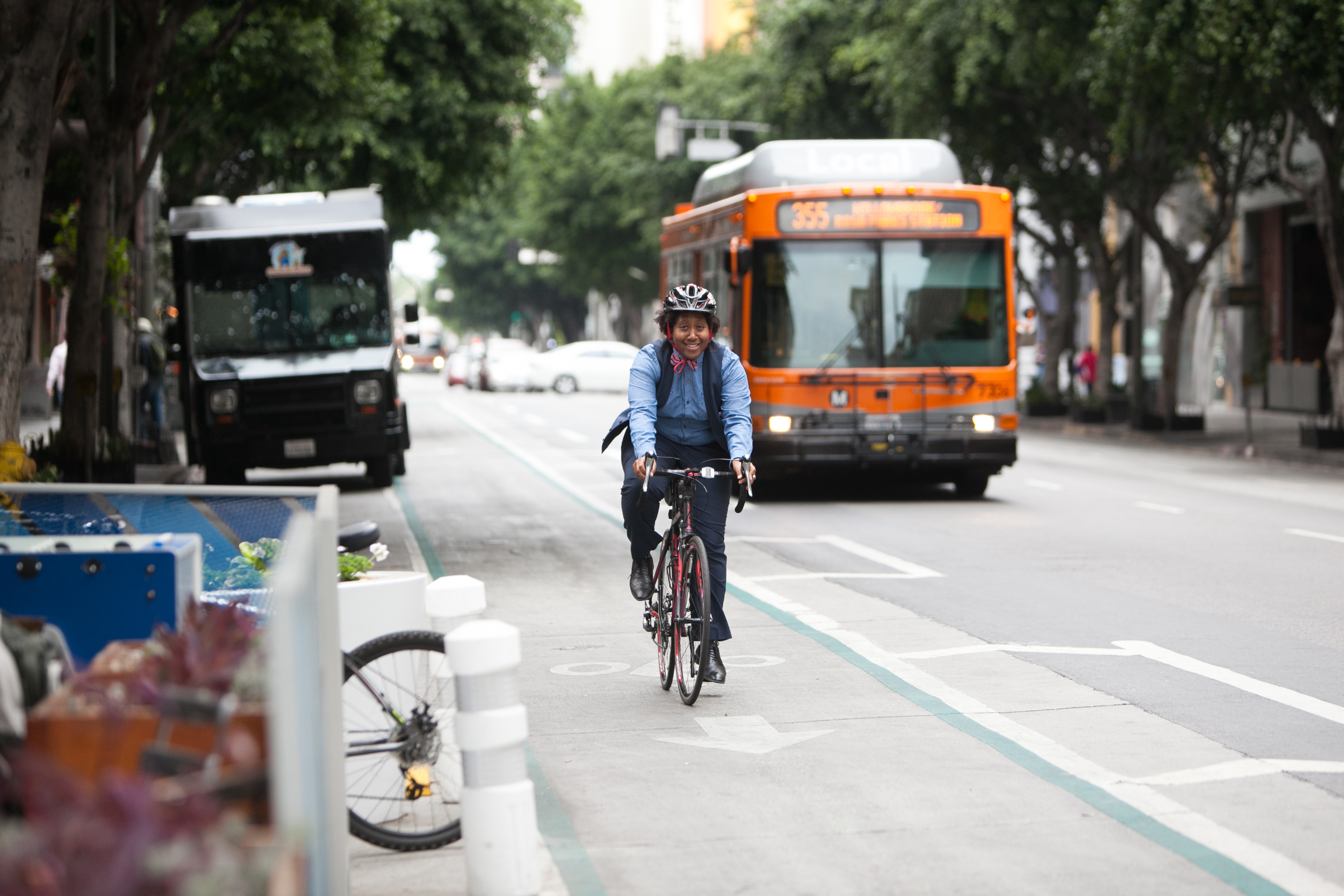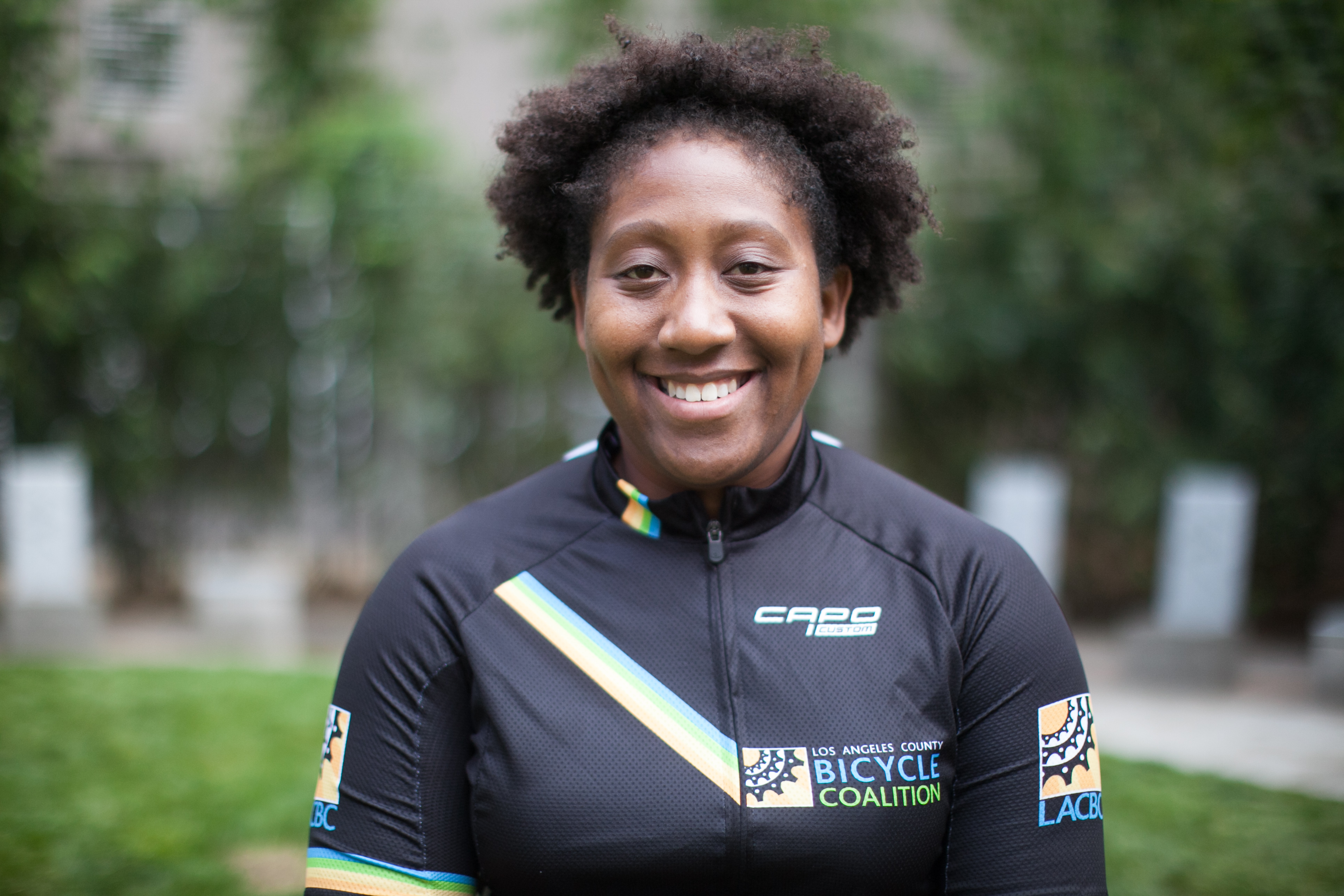
News
By Natasha Riveron, January 3, 2019

On January 15th, the National Complete Streets Coalition is hosting the Ninth Annual Complete Streets Dinner with special guest Tamika L. Butler. We had an opportunity to speak with Tamika about how she got involved with transportation work, her take on the future of transit equity, and why she enjoys working with the National Complete Streets Coalition.
The Ninth Annual Complete Streets Dinner will be January 15, 2019 in Washington, DC during the 2019 Transportation Research Board meeting. This intimate and fun event brings together top Complete Streets professionals, policymakers, supporters, and friends. Tamika Butler, a national leader in equitable transportation work, will be the featured speaker. Learn more about her work with the interview below and make sure to buy your ticket today to hear from her in person.
Reserve your seat at the 2019 dinner
Below is a transcript of our interview with Tamika Butler, lightly edited for length and clarity.
Emiko: Coming from a law background, how did you get involved in the active transportation field and what has kept you around?
It is clear to me that in the way we build our environments, our cities, our towns, our transportation, we’re keeping certain people in and we’re keeping certain people out. We’re giving certain people access to mobility—transportation or economic mobility. All of this is intentional.
Tamika: I practiced law for a few years in the Bay Area, and then I met my now wife and moved to LA. In the Bay Area, I walked or took public transportation everywhere. It’s funny, because a lot of people now take pride in being a “transit person” and if I’m honest, I didn’t think about it that much because it’s just what I did San Francisco.
When I moved to LA I was constantly in my car and was no longer the active person I had been in the Bay Area. My doctor said I really needed to take better care of myself. A friend convinced me to get a bike and do the AIDS/lifecycle ride from San Francisco to Los Angeles, despite my concerns about being the chubby girl on the vehicle with the small wheels.
I thought I was going to do the AIDS/lifecycle ride, and then put the bike away and never touch it again. But as soon as I finished, I missed it. All of a sudden I was biking to the store, I was biking to hang out with friends. I hadn’t been loving LA because it was so spread out and I spent so much time in my car. But I did like it when I was on my bike—I could see my environment and be close to so many different communities. I fell in love with LA because of my bike while getting healthy.
When I found out there was an opening for an Executive Director at the bike coalition, I remember doing a little research and saying “I’m a civil rights lawyer—I can’t work at a bike coalition! I’m gonna lose my street cred. Bike lanes are the first sign of gentrification. I can’t be part of this movement.”
Then a friend in the Bay Area who I had worked with at a public health organization reached out and told me to apply for the bike coalition job. I gave her all the reasons it wasn’t for me. She said “Check out the person we just hired at our bike coalition. He’s a superstar and has done all of this great work, but at the end of the day, he’s still a straight, white man. I’m a woman of color living in the city, where I’m getting displaced and tech busses are interfering with our transportation and housing. There are not enough people who understand the intersections of transportation with these other areas of our lives and I think you do.”
I applied for the position and was surprised to get it. That’s how I came to this space, but this is why I stayed:

Often, I think, folks of color and first generation folks or, frankly, just folks who feel civically minded and social justice engaged don’t think about planning or transportation. We’re told to become lawyers and doctors or work on criminal justice reform and educational equity. It felt like planning was the best kept secret, that we were keeping social justice warriors out to maintain the status quo. It is clear to me that in the way we build our environments, our cities, our towns, our transportation, we’re keeping certain people in and we’re keeping certain people out. We’re giving certain people access to mobility—transportation or economic mobility. All of this is intentional.
Emiko: There is a big movement in the transportation world to talk about equity and I believe that it’s because people think it’s the right thing, but it also seems like equity is just the thing that’s hot right now. What would you tell people who are interested and/or work in transportation about why equity should really matter to them?
We can’t do our best work if we continue to narrowly focus on what we view as the most common user, as the most important or “normal user.”
Tamika: When I went to my first National Bike Summit, there was a panel on women in the bike movement and it was focused on why and how certain brands market specifically towards women. There was social media as well as men in the room saying it was sexist and asking why we were talking about this. It really struck me, coming from a law background, because lawyers definitely hadn’t figured it out, but at least law firms were putting tabs on their website that said “women in the firm” or “people of color in the firm.” People in the planning and transportation field were starting to use the word “equity” but there were still louder voices asking why it was even important.
There are some firms, organizations, and agencies who still don’t get it. They are still saying “that’s just not who we are, we just do good work no matter what. We don’t need to focus on equity.” We can’t do our best work if we continue to narrowly focus on what we view as the most common user, as the most important or “normal user.” People are coming to understand that we have to talk about what authentic community engagement is if we want a project to be successful. We have to look for organizations and people to work with who understand equity and we have to think about gender nonconforming people and older folks and kids and people with disabilities and people of color—the full spectrum.
Sure there are still clients and cities where this isn’t taking hold. But overall, you have to understand equity and you have to know how the work you are doing is equitable and inequitable. If just doing the right thing isn’t enough, in a purely practical business sense, if you can’t pivot to do that work, then you will be left behind.
Emiko: To what extent do you think it has become the burden of marginalized people to catch others up on equity in this field that is predominantly white and male?
The second we step into a space to do good work—even if we want to focus on traffic lights or parking—because there are so few of us, there is this expectation that we are going to teach other people .
Tamika: While I don't necessarily always want to be in the spotlight, there is always this pressure: If I don’t speak up, whose gonna do it? There are so few of us in this space, so we all know each other. Sometimes it doesn’t matter what I want to do, it’s about being a person who speaks up and will not let injustice stand.
People of color, women, queer folks, and especially people who inhabit multiple identities—there is a trap. We are passionate and want to do good work. But the second we step into a space to do good work—even if we want to focus on traffic lights or parking—because there are so few of us, there is this expectation that we are going to teach other people . It’s annoying when no matter how many times you say “I want to do the work” there is this expectation that you do the work as well. Then, when you do it, and you do it well, you’re penalized for doing it well.
Now you’ve made people uncomfortable. Why can’t you just focus on the work? Why does it always have to be about equity? Why are you making this about community engagement when we just need to get this project on the ground?

That’s why there is so much burnout for people of color, women of color because we often find ourselves in places where we just can’t win. We can become the experts in equity and be really good at talking about equity. Then people ask, “but what do you know about planning?”
It’s unfair to us as people and the field overall because the field is missing out on exceptionally talented, thoughtful people who could honestly do both. There are a folks who do get it, who do want to push themselves and the field. Folks at firms, in nonprofits, and in government. Those are the folks that mentor me, that I love working with and learning from, that keep me grounded, and that have helped me continue to grow. The only people trying to pigeonhole us are gatekeepers who don’t want to be reflective enough to acknowledge the power they have in the situation and how they are using it poorly.
Emiko: Why are you excited to be part of this year’s Complete Streets Dinner?
Tamika: I love that has been able to make folks uncomfortable, while also moving the conversation forward in actionable ways—ways that I care about as someone who came to this work through the bicycle advocacy world as a vulnerable user on many levels. You’re not afraid to have tough conversations. You don’t bring in people like me to just preach to the choir. There are ways in which people in the room are part of the choir, but there are also people hearing the message for the first time. You really have an amazing ability to convene the right people and get great rooms together.
Emiko: What are your thoughts on new mobility and its effect on transportation equity?
Tamika: New mobility is, in some ways, helping to accelerate the equity conversation. Maybe not in the most authentic way, but when you’re dropping a whole bunch of autonomous vehicles or scooters in communities all over the city, there is going to be dialogue. People think new mobility is going to help us with disparities. But it is helping people realize that disparities may look different but the equity conversation is here to stay. Especially at a time when the tech sector is coming in—like the recent disaster of a tunnel in LA—transportation folks are very publicly saying that it's an elitist tunnel prioritizing cars. New mobility is making us think creatively about new transportation issues but also helping elevate issues that have been there all along.
We are looking forward to having Tamika Butler as our special guest for the Ninth Annual Complete Streets Dinner on January 15, 2019. Purchase your ticket today.
Related News

© 2026 Smart Growth America. All rights reserved
Site By3Lane Marketing












